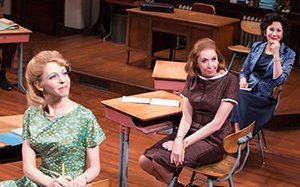In The Babylon Line, three women friends take an adult-ed writing class. They are named Anna Cantor, Frieda Cohen, and Midge Braverman. “We call ourselves the Furies,” said Julie Halston, who plays Midge. “When we told Rich” – Richard Greenberg, the play’s author – “he said that if he were a TV writer, ‘The Furies’ would be the Babylon spin-off.”
Until that day, Anna, Frieda, and Midge are spinning away on the stage of the Mitzi E. Newhouse. “The space is so intimate,” Halston said. “It’s as if we are inviting the audience into our living room. Even if they didn’t grow up on Long Island, they react as if they know these characters.”
Halston, as it happens, did grow up on Long Island. “I was raised in Commack. It was a development, but a little bit fancier than Levittown, where these ladies live. A $7,000 house in Levittown sold for $16,000 in Commack. When my parents bought our place, the down payment was $500.” When Halston, who grew up with two sisters, recently sold the place, it fetched “considerably more.”
“I’m very familiar with the Babylon line,” Halston said. “Even today, I take it three or four times a year to visit friends. The Long Island Rail Road will never be unfamiliar to me.”
Also familiar: the kind of woman Halston plays. “My family wasn’t Jewish, but we had Jewish neighbors. I was always impressed that when I went over to their houses they had real books, not the Reader’s Digest Condensed versions.” That neighborly world, Halston continued, was very comforting. “At my friends’ houses, I knew that I would find the same Nestle’s Quik and peanut-butter-and-jelly sandwiches that we had at home.”
As the 1960s slid into the 1970s, the world of these close-knit homemakers began to change. Referring to the actor/playwright Charles Busch, with whom Halston established her career in the 1980s with such downtown classics as Vampire Lesbians of Sodom, she said, “Charles used to talk about a family he knew growing up. They were called the Diamonds. When he returned from college, suddenly they were calling themselves “the Dee-a-monds.”
Halston’s own parents were also polishing their act. “In the 70s, they took up Transcendental Meditation. My father – a medic on the front lines during World War Two – was meditating! They would be in the living room doing their spiritual practice while my friends and I were upstairs getting stoned. We just roared.”
Halston’s view of her parents is not only gently chiding but strongly affectionate. “My mother loved being a mom. Her generation – and the generation of the women in The Babylon Line – had grown up with hardship. They went through the war. So to them having a home and healthy children meant that they had made it.”
It might be tempting, Halston went on, to see women like Midge and Frieda and Anna as caricatures. “But they are not cartoons. They are people who are stumbling through changes in their lives, changes in society. They’re making an effort, which is why we have sympathy for the Furies. We understand their anger but also their struggle.”
Brendan Lemon is the editor of lemonwade.com
